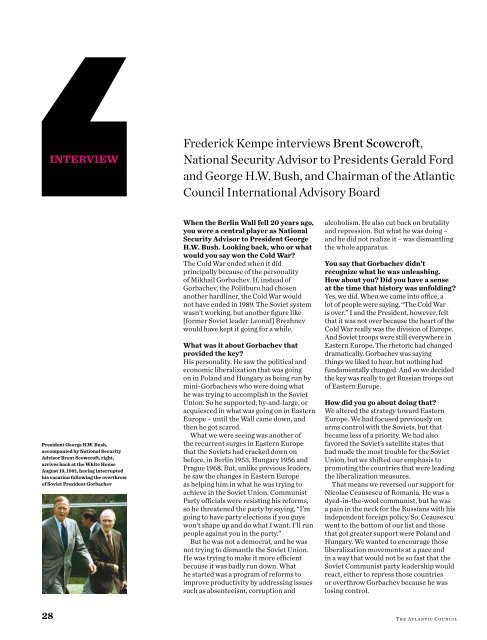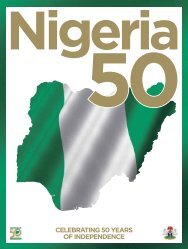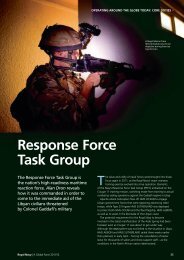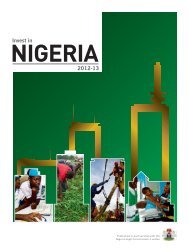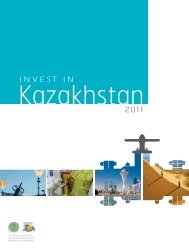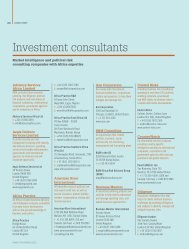NATO – A Bridge Across Time - Newsdesk Media
NATO – A Bridge Across Time - Newsdesk Media
NATO – A Bridge Across Time - Newsdesk Media
Create successful ePaper yourself
Turn your PDF publications into a flip-book with our unique Google optimized e-Paper software.
President George H.W. Bush,<br />
accompanied by National Security<br />
Advisor Brent Scowcroft, right,<br />
arrives back at the White House<br />
August 19, 1991, having interrupted<br />
his vacation following the overthrow<br />
of Soviet President Gorbachev<br />
Frederick Kempe interviews Brent Scowcroft,<br />
National Security Advisor to Presidents Gerald Ford<br />
and George H.W. Bush, and Chairman of the Atlantic<br />
Council International Advisory Board<br />
When the Berlin Wall fell 20 years ago,<br />
you were a central player as National<br />
Security Advisor to President George<br />
H.W. Bush. Looking back, who or what<br />
would you say won the Cold War?<br />
The Cold War ended when it did<br />
principally because of the personality<br />
of Mikhail Gorbachev. If, instead of<br />
Gorbachev, the Politburo had chosen<br />
another hardliner, the Cold War would<br />
not have ended in 1989. The Soviet system<br />
wasn’t working, but another figure like<br />
[former Soviet leader Leonid] Brezhnev<br />
would have kept it going for a while.<br />
What was it about Gorbachev that<br />
provided the key?<br />
His personality. He saw the political and<br />
economic liberalization that was going<br />
on in Poland and Hungary as being run by<br />
mini-Gorbachevs who were doing what<br />
he was trying to accomplish in the Soviet<br />
Union. So he supported, by-and-large, or<br />
acquiesced in what was going on in Eastern<br />
Europe <strong>–</strong> until the Wall came down, and<br />
then he got scared.<br />
What we were seeing was another of<br />
the recurrent surges in Eastern Europe<br />
that the Soviets had cracked down on<br />
before, in Berlin 1953, Hungary 1956 and<br />
Prague 1968. But, unlike previous leaders,<br />
he saw the changes in Eastern Europe<br />
as helping him in what he was trying to<br />
achieve in the Soviet Union. Communist<br />
Party officials were resisting his reforms,<br />
so he threatened the party by saying, “I’m<br />
going to have party elections if you guys<br />
won’t shape up and do what I want. I’ll run<br />
people against you in the party.”<br />
But he was not a democrat, and he was<br />
not trying to dismantle the Soviet Union.<br />
He was trying to make it more efficient<br />
because it was badly run down. What<br />
he started was a program of reforms to<br />
improve productivity by addressing issues<br />
such as absenteeism, corruption and<br />
alcoholism. He also cut back on brutality<br />
and repression. But what he was doing <strong>–</strong><br />
and he did not realize it <strong>–</strong> was dismantling<br />
the whole apparatus.<br />
You say that Gorbachev didn’t<br />
recognize what he was unleashing.<br />
How about you? Did you have a sense<br />
at the time that history was unfolding?<br />
Yes, we did. When we came into office, a<br />
lot of people were saying, “The Cold War<br />
is over.” I and the President, however, felt<br />
that it was not over because the heart of the<br />
Cold War really was the division of Europe.<br />
And Soviet troops were still everywhere in<br />
Eastern Europe. The rhetoric had changed<br />
dramatically. Gorbachev was saying<br />
things we liked to hear, but nothing had<br />
fundamentally changed. And so we decided<br />
the key was really to get Russian troops out<br />
of Eastern Europe.<br />
How did you go about doing that?<br />
We altered the strategy toward Eastern<br />
Europe. We had focused previously on<br />
arms control with the Soviets, but that<br />
became less of a priority. We had also<br />
favored the Soviet’s satellite states that<br />
had made the most trouble for the Soviet<br />
Union, but we shifted our emphasis to<br />
promoting the countries that were leading<br />
the liberalization measures.<br />
That means we reversed our support for<br />
Nicolae Ceausescu of Romania. He was a<br />
dyed-in-the-wool communist, but he was<br />
a pain in the neck for the Russians with his<br />
independent foreign policy. So, Ceausescu<br />
went to the bottom of our list and those<br />
that got greater support were Poland and<br />
Hungary. We wanted to encourage those<br />
liberalization movements at a pace and<br />
in a way that would not be so fast that the<br />
Soviet Communist party leadership would<br />
react, either to repress those countries<br />
or overthrow Gorbachev because he was<br />
losing control.<br />
28 The Atlantic Council


